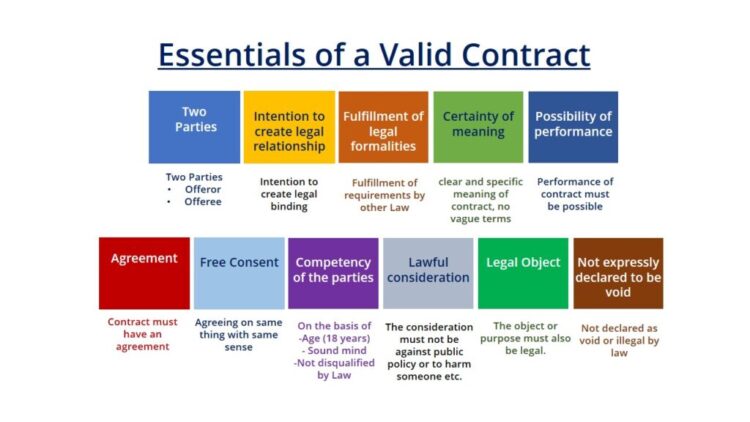An offer from a large IT company is the cherished desire of many IT specialists. However, along with the offer, a contract with an IT company comes into the IT specialist’s life. This is a confidentiality agreement, written in legal language, in which there are many pages and incomprehensible conditions.
IT contracts are easy if you understand what you need to pay attention to. Company https://spincareer.com/ suggests considering the basic IT expert checklist for a contract with an IT company.
Page Contents
What are the basic elements of a valid contract?

- Source: revv.so.
The contract is an important document that regulates the rules of work between the customer and the service provider. In the IT industry, the subject of the contract is software development, layout, testing, promotion, etc. The contract performs the function of protecting the interests of the company and the developer in the implementation of the terms of reference. In case of disputes between the parties regarding the correction of bugs, changes in the TOR during the sprint, or errors in the operation of integrated systems – the contract helps to resolve problematic issues with negotiations. Using a written agreement, you streamline the terms, payment, and liability for a breach of the transaction
When creating contracts for IT services, it is necessary to pay attention to:
specifics of the project;
term;
customer requirements;
timing;
price;
ways to resolve disputes;
protection of intellectual property;
rules for electronic document management.
You should consider the basic checklist for a contract with an IT company.
Social guarantees and taxation
Social guarantees are the means, methods, and conditions by which the living conditions are provided – the minimum cash payments, the receipt of which is guaranteed by the contract. This includes vacation, sick leave, maternity benefits, etc.
Also, specify how much you will receive for your services after taxes
Scope of work and payment

Source: monday.com
We recommend that you always check which services are specified in the contract
For example, if you get a job as a QA tester, and sign a contract for programming or information services, this is a mistake. Be sure to check whether the list of services corresponds to the contract
Also, you should understand how you accept and coordinate tasks: in the task manager, by email, through instant messengers, etc.
Having received a contract from an IT company, firstly you should open and read the section on payment for services. Pay attention to whether the cost of services was displayed correctly on the contract. For example, you agreed that you will receive a fixed amount once a month, and the contract indicates an hourly payment for services, or the amount of the fixed amount is less than what you agreed on.
Another important condition of an IT contract for many IT specialists is compensation for additional expenses: the purchase of licensed software, work after hours, the purchase of educational courses, etc. Be sure to check with the representative of the IT company, whether such expenses will be compensated and where it is written in the contract.
If everything is ok, proceed to the points on the mechanics of payment for services:
Who prepares and issues invoices?
When and for what period should they be exhibited?
How should invoices be sent – handed over in person, by mail, or through the corporate invoice system?
You will need to fulfill all these conditions so that the IT company has no reason to refuse to pay you for services
How to negotiate the terms of the contract?
You should
Be polite.
Ask questions at the stage before receiving a job offer.
Be aware of the terms of the contract and your rights.
Be ready to refuse unfavorable conditions.
Submit for discussion fundamental and non-principled issues.
Be especially careful when concluding a contract so that there are no troubles.
Negotiating your salary

Source: forbes.com
As a new hire, you will likely be asked to sign a contract that includes your salary and other important details about your employment. While it is important to read and understand your contract before signing, there are a few key things to keep in mind when negotiating your salary.
First, do your research. Know what the average salary is for your position in the area where you will be working. This will help you determine if the salary being offered is fair.
Next, be prepared to negotiate. If you feel that the salary being offered is not fair, be prepared to discuss this with your potential employer. It is important to remember that you are not obligated to accept the first offer.
Finally, don’t be afraid to ask for what you want. If you feel that you deserve a higher salary, don’t be afraid to ask for it. Remember, it is better to negotiate up from a low offer than to accept a low offer without trying to negotiate.
What benefits to ask for
Asking for the right benefits when you sign your first contract with an IT company can make all the difference in your career. Here are a few things to keep in mind:
-Paid time off: Make sure to ask for at least 2 weeks of paid time off per year. This will give you some flexibility to take vacations and stay healthy.
-Health insurance: Most IT companies will offer some form of health insurance, but be sure to ask about coverage for yourself and your family. You don’t want any surprises down the road.
-Retirement benefits: Many IT companies offer 401k plans or other retirement savings plans. Be sure to ask about how much they match and what the vesting schedule is.
-Stock options: If the company is publicly traded, they may offer stock options as part of your benefits package. This can be a great way to boost your earnings potential.
-Bonus structure: Some IT companies offer bonuses based on performance. Be sure to ask about how these bonuses are calculated so you can plan accordingly.
Conclusion
Working as an IT contractor can be a great way to get your foot in the door of a company and learn new skills. However, it’s important to remember that you are still an employee of the company and need to follow its rules and regulations. When signing your first contract, be sure to read through it carefully and ask questions if anything is unclear. It’s also important to make sure you are getting paid what you deserve, so don’t be afraid to negotiate for a higher rate if you feel like it’s warranted. Finally, remember that working as a contractor can be a great way to build your experience and grow your career, so make the most of it!





